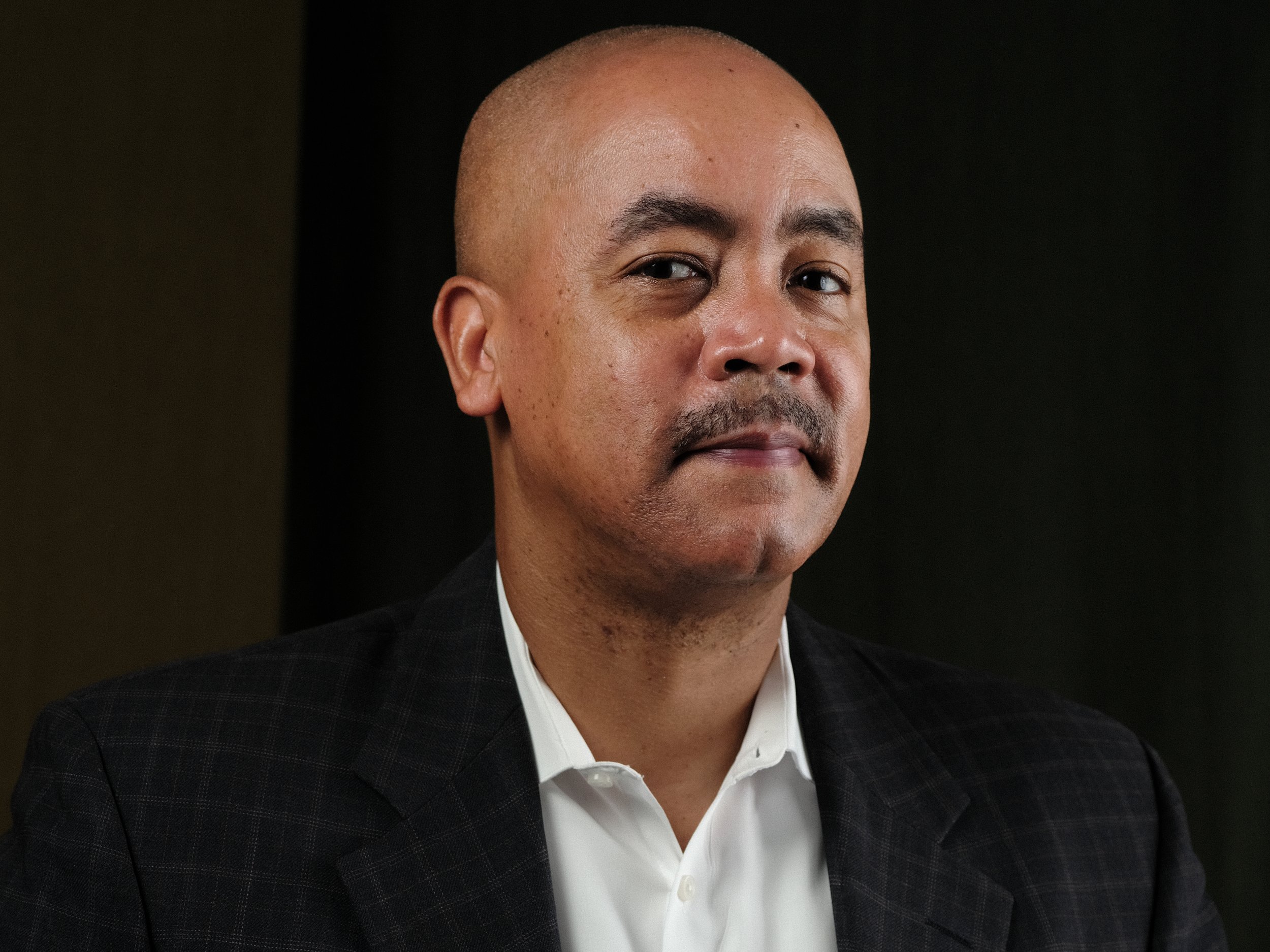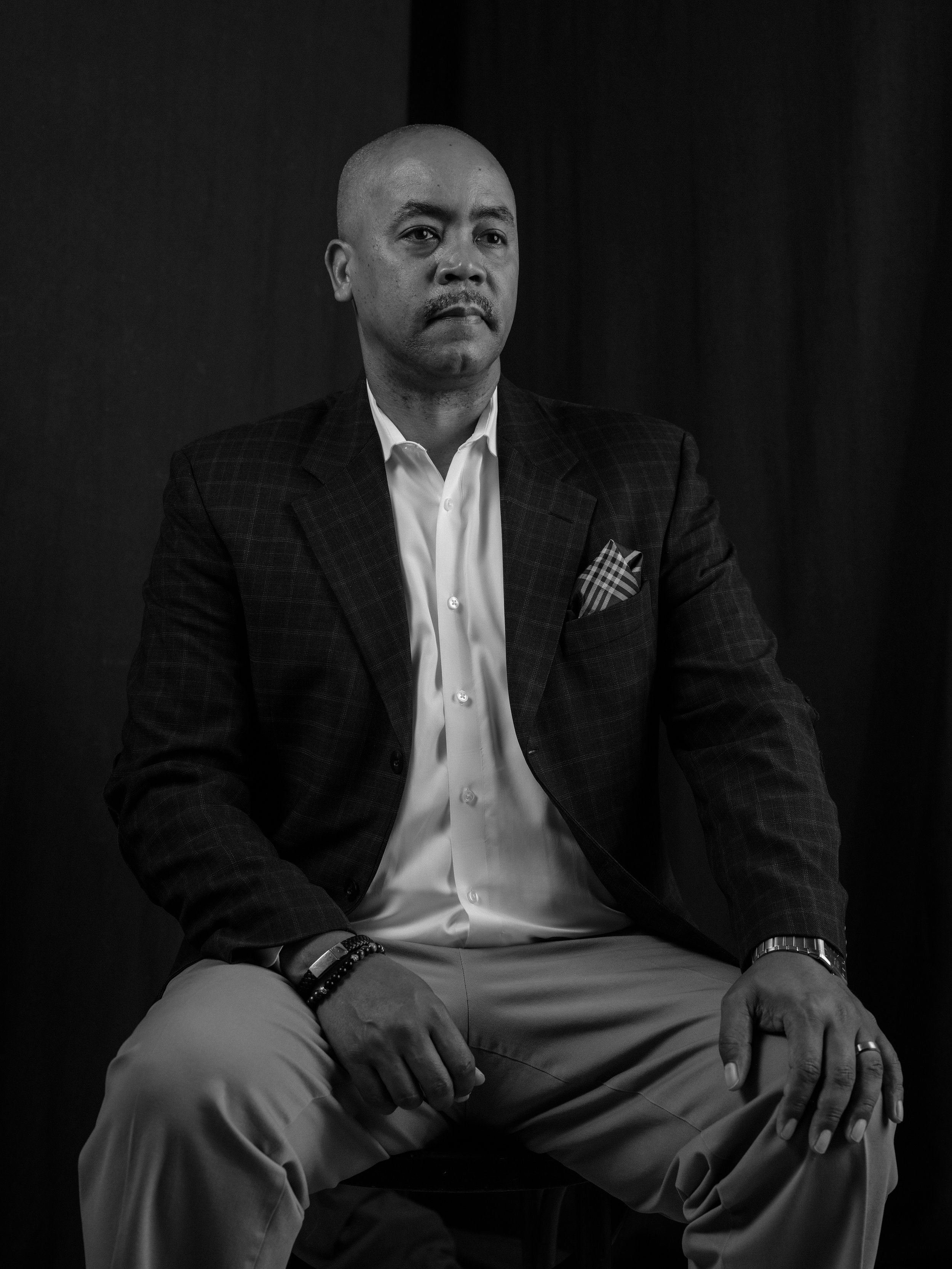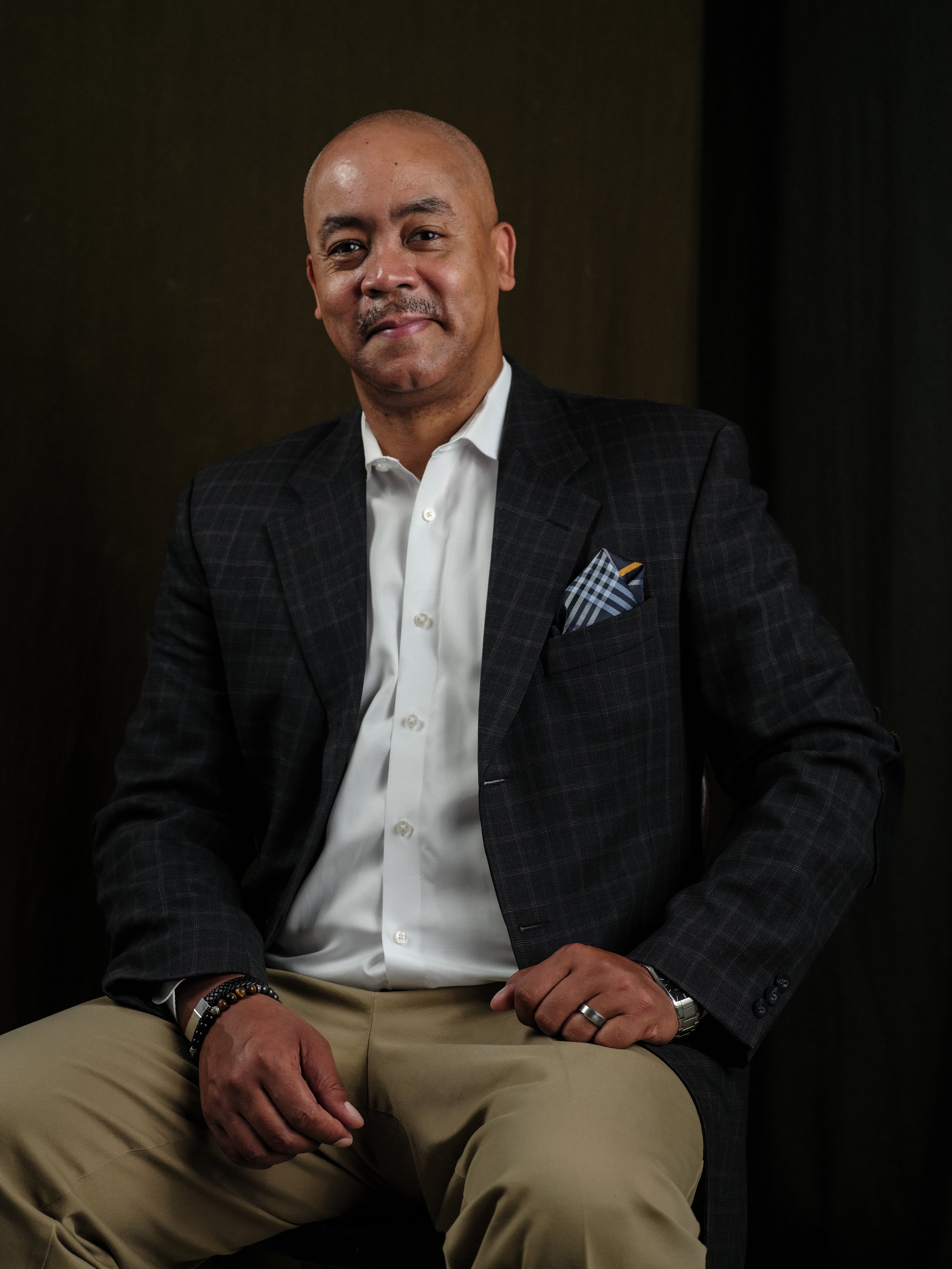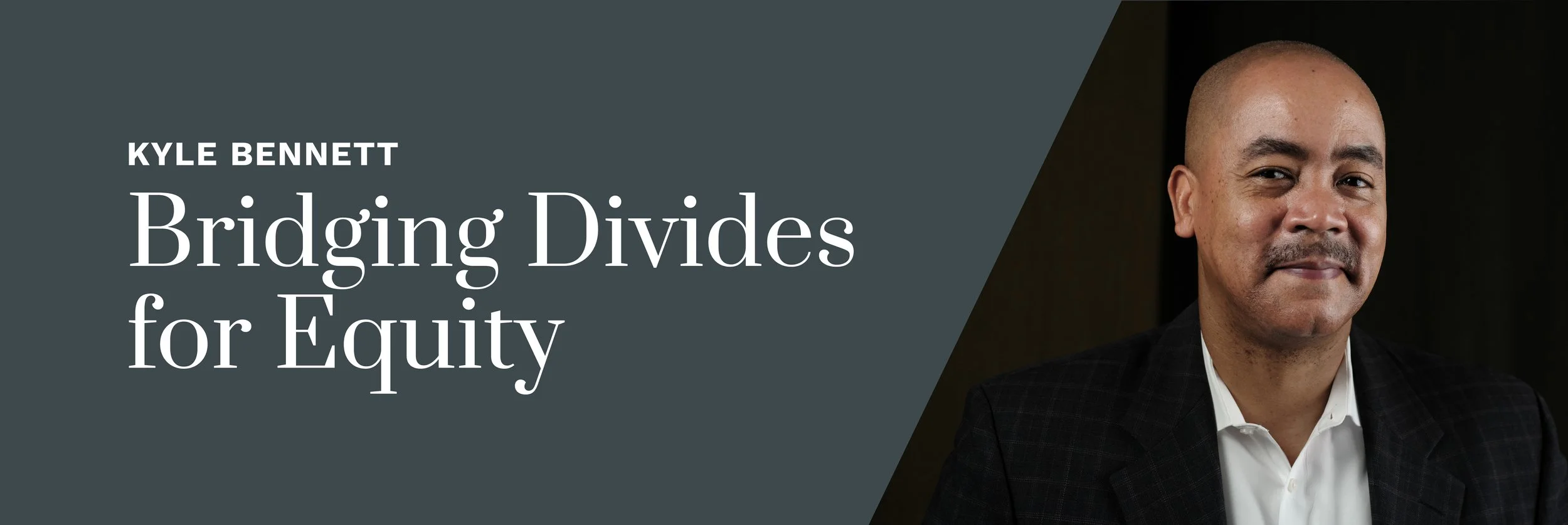Bridging Divides for Equity
Through Jonathan Pitts-Wiley's lens at The Slate Studio, Kyle Bennett's resolve comes into sharp focus - a testament to daily acts of resilience, compassion, and devoted commitment to the community.
As a United Way of Rhode Island leader whose personal struggles and professional wins reflect grit and determination, Kyle's journey is not just about overcoming obstacles but transforming lives and communities through the power of equity and empathy.
Kyle sits down for an interview, casually discussing general topics. But as the conversation unfolds, we soon realize that there's nothing ordinary about Kyle or the weight he carries on his shoulders. Suddenly, Kyle's phone rings. It's a call he can't ignore - a cousin in the hospital battling addiction. The pain in Kyle's voice is palpable as he explains the situation:
"My cousin's in the hospital, and he's been struggling with addiction for a long time, but next week is his youngest daughter's birthday, and she passed away last year. I think he just relapsed over the weekend and had to go to the hospital, and it was terrible."
This moment of vulnerability sets the tone for our conversation, revealing a leader who understands struggle intimately. Kyle's experiences with hardship have profoundly shaped his leadership and community service approach.
As we get more into Kyle's professional life, a clear theme shows his commitment to equity. This commitment aligns perfectly with the mission of United Way of Rhode Island, which Kyle passionately articulates:
"2020 spotlighted the failure for us, and everyone involved, of the war on poverty. After 50 years, this effort has been ineffective in creating opportunity and prosperity for all members of our community. The pandemic showed that where you live, and the color of your skin is a powerful determinant of your likelihood to live or die from COVID-19. And, murders of our neighbors like George Floyd and Breonna Taylor remind us that Black Rhode Islanders are eight times as likely to be in jail as whites. That's why we felt it was so important that our plan explicitly address systemic inequity – i.e., policies that promote unequal opportunity and treatment of people of color. We know it's the right thing to do morally. It's also a smart thing to do economically."
This mission statement underscores the urgency and importance of Kyle's work. He explains how this commitment to equity shapes everything they do:
"One personal belief that significantly influenced my decision is the unwavering commitment to equity. The belief shapes everything that we do, and by placing equity at the center of our Live United 2025 strategic plan, it provides the infrastructure for the way that we invest in the community, the way that we approach policy setting, and for all of our internal processes."
This commitment to equity isn't just talk. Kyle has put it into action through concrete initiatives. During the last round of grant proposals, they focused on organizations led by people of color that serve people of color. The reasoning behind this approach is profound:
"We have people who are closest to the problem that are most often closest to the solution. So think about people who come from neighborhoods and communities that we serve who look like and are part of the neighborhoods that are being addressed with residents, businesses, and other nonprofits to create solution sets. We know that those individuals and those organizations will most likely be the ones who are the most successful in the long term, not just providing short-term relief, but ultimately solving problems."
But Kyle's mettle was truly tested during the COVID-19 pandemic, a crisis that starkly highlighted the inequities United Way seeks to address. This period challenged his resolve, creativity, and commitment to the community. In response to the crisis, Kyle and his team launched the Safe Harbor Housing program, designed to keep people housed and reduce evictions.
The program revealed deep-seated inequities in access to technology and resources. Many people couldn't easily upload documents to digital systems or access online services. Kyle's response to this challenge demonstrates his hands-on approach and dedication:
"Our approach really was to be able to accept information digitally, but also to connect with people directly. I mean, I worked most of the time at our location, 50 Valley Street, but some of the time I was at home. And if that meant that someone needed to drop off a document or I had to bring a form for them to fill out, meet with them and we were still in the early stages of COVID so we did not necessarily know the transmission rates and how likely we were to be impacted but what we did know was that it was important for people to have access to a real human in real-time and that we could help them to work through problems."
This dedication to serving the community, even in the face of personal risk is proof of Kyle's character and commitment. But how does he inspire and motivate his team during such trying times? His answer reveals a leadership style rooted in empathy and leading by example:
"When I think about what's critical in helping to support my team during the trying time, the first is that you have empathy, that you recognize that all the people that you work with, that you partner with are also going through a trying time."
He continues, "The second way to support my team during the trying time is by leading by example. Really stepping in doing the hard work rolling up your sleeves and letting them see that you're about this work, too."
This combination of empathy and leading by example creates a sense of camaraderie that lasts beyond the immediate crisis. As Kyle puts it, "When you get through a tough time like the initial stages of COVID, a tough time like the floods of 2010, a tough time like the government shutting down in 2019. You again build that camaraderie and a sense of “can-do” spirit."
Kyle's leadership philosophy extends beyond crisis management. He sees himself as a "growth manager" for his team:
"I think of myself as a, for my employees, my staff, I think of myself as a growth manager. I think of having an opportunity to sort of step aside and ultimately allow my team members to lead. This is partly making sure that they have the proper instruction, that they come to the table prepared, they understand the consequences. And again, I'm able to help remove any barriers that are in their way."
This approach extends beyond his immediate team to the broader community. Kyle recognizes the importance of amplifying voices that have been historically marginalized:
"I think it's important in my community to be able to help people that have not necessarily had the same opportunities or been able to leverage their voice, in the same way, to recognize that their voice is their power and not taking every opportunity to lead but just positioning myself strategically to make sure sometimes I'm leading other times I'm supporting and helping bolster not just the next generation but people who are my age that also haven't had those opportunities."
As our conversation draws close, Kyle's enthusiasm peaks when discussing the 2-1-1 program, a vital resource that connects people with essential services: "211 is gonna be there. People don't know where to go. They call three numbers, and they say, hey, where can I register to vote? How can I find out what's on the ballot? Just give us a call."
This program embodies the principles Kyle discussed throughout our conversation - accessibility, equity, and community support.
As we reflect on Kyle Bennett's journey, we see a story of resilience, empathy, and determined commitment to equity and community. From personal struggles with family addiction to professional challenges during a global pandemic, Kyle has consistently risen to meet these obstacles with compassion and determination.
His leadership style, rooted in empathy and leading by example, has not only guided his team through difficult times but has also fostered a sense of camaraderie and shared purpose. His commitment to equity has shaped policies and initiatives that aim to address systemic inequalities and empower marginalized communities.
Kyle's story is more than just a tale of one leader or organization. It's a testament to the power of compassion, the importance of equity, and the transformative impact of community-focused leadership. It reminds us that even in the face of personal and professional challenges, we can make a profound difference in the lives of others.
Leaders like Kyle Bennett give us hope as we face an uncertain future. They show us that with empathy, dedication, and a commitment to equity, we can build stronger, more resilient communities - one person, one program, one day at a time.
Kyle's journey teaches us that true leadership is not about avoiding struggles or hardships but about facing them head-on with courage and compassion. It's about recognizing that our personal experiences, no matter how difficult, can inform and strengthen our ability to serve others. It's about understanding that equity is not just a buzzword but a crucial foundation for building a just and thriving community.
The final frames at The Slate Studio capture more than just an image - they capture a vision for change. Ultimately, Kyle Bennett's legacy is not just in the programs he's implemented or the crises he's navigated. It's in the lives he's touched, the team members he's empowered, and the community he's helped to strengthen. His story reminds us that with a resilient spirit, deep empathy, and a commitment to equity, we can all be agents of positive change in our communities.
As we face the challenges of tomorrow, may we all strive to embody the resilience, compassion, and dedication that Kyle Bennett has demonstrated throughout his journey. In doing so, we not only uplift ourselves but also create a ripple effect of positive change that can transform entire communities, bringing us closer to the vision of equity and opportunity for all that the United Way of Rhode Island so passionately pursues.



Portraits by Jonathan Pitts-Wiley

